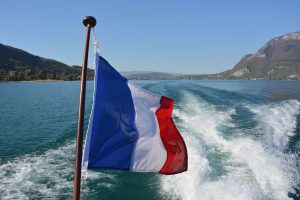France has been in the Indo-Pacific longer than conventional wisdom cares to acknowledge. French territories in the area span 11.7 million square kilometers of the South Indian and Pacific oceans, giving the European power one of the world’s largest Exclusive Economic Zones (EEZs). This not only grants France naval and other economic advantages, these very parcels of land and sea allow France to potentially gain an outsized influence in the Indo-Pacific arena. Indeed, if France chooses to speak, it cannot be ignored.
Among France’s overseas territories are the Mayotte and La Réunion Islands, Scattered Island, the French Southern and Antarctic lands in the southern Indian Ocean, and New Caledonia, Wallis-and-Futuna, French Polynesia and Clipperton in the Pacific Ocean.
To be sure, France is rarely mentioned as an important actor in the Indo-Pacific. Rather, more prominence is given to its role as a permanent member of the United Nations Security Council. It can veto any decisions in that chamber. This gives France a power that most nations can only envy.
Yet, it should be remembered that France was the first member of the European Union (EU) to embrace the concept of the Indo-Pacific, which was itself first articulated by Japan’s former Prime Minister Abe Shinzo.
The French territories and islands mentioned above are home to 1.5 million French nationals and 8,000 military personnel, but their value are incalculable given their strategic location. Nonetheless, France’s budget dedicated to these territories remains remarkably low, which in turn explains the financial help that those overseas departments have been receiving from the EU through the European Regional Development Fund (ERDF). This fund has the objective of supporting the outermost regions of European territories: the Mayotte program, only dedicated to the Mayotte Island, received 12 million euros; the Indian Ocean program, surprisingly only including La Réunion Island, received 63.2 million euros. France then passed another 2.43 billion euro budget for 2021 aimed for all of its overseas territories, an increase of 2.5 percent from 2020.
In military terms, French participation in the region is not focused on any one island. In contrast to China’s People’s Liberation Army-Navy (PLAN), which is concentrated on the southern coast of the country, French troops are divided among its territories in the region. Be that as it may, France is aware of the geostrategic importance of the Indo-Pacific as the pathway that connects Europe and Asia. Any attempts to manifest its national interests and sovereignty in the region cannot ignore this maritime basin, even if the EU lacks a military presence in the region for the time being.
But things are changing. French President Emmanuel Macron has kept an eye on the evolution of the situation in the Indo-Pacific, declaring France to be an Indo-Pacific power, too. While the strong presence of the United States in the Indo-Pacific remains ongoing, the French leader is also trying to stay true to the new European catchphrase of “strategic autonomy.”
That said, France’s intentions are to become increasingly visible in the Indo-Pacific arena. For example, the “Paris-Delhi-Canberra axis” was put together, despite the lack of interoperability per se. The alliance strives for naval security cooperation in the region. While this could lead to the emergence of tensions with China, this does not seem to bother the three powers. The triangulation of the countries’ ties is aimed at unifying their geostrategic interests in the Indo-Pacific.
For now, France is not alone in taking an enhanced interest in the Indo-Pacific. Other European partners concur with France as to the region’s importance. Britain’s activities in the region have been qualified as a “comeback” of sorts also. As a consequence of Brexit, London has announced new measures to return to the Indo-Pacific region. While this activity was not necessarily welcomed by China, the new measures follow the footsteps of the U.S. regarding the maintenance of a free and accessible Indo-Pacific region.
Agreeing with France and the U.K., Germany has also ventured into the region. In a recent series of policy guidelines for the Indo-Pacific, Chancellor Angela Merkel’s government has enunciated the new strategic approach, which is mostly based on cooperation over distinct issues first. As articulated in the title of the document – “Germany – Europe – Asia: Shaping the 21st Century Together” – Berlin supports the European partnership and collaboration in the Indo-Pacific theater.
However, German military activities in the region remain more discreet than those of France and Britain. France would undoubtedly be stronger than other European nations. Whether or not it is accompanied by its neighboring countries, it is clear France has had its eyes set on the Indo-Pacific region.
Should France increase its budget dedicated to the region, then what Macron recently stated would be accurate: France is an Indo-Pacific power, and plans to be for the long haul. Given its strategic territories, France can increase its presence in the Indo-Pacific in the blink of an eye.
Kim Beng Phar is founder/CEO of Strategic Pan Indo-Pacific Arena.
Clementine Bizot is senior research fellow at Strategic Pan Indo-Pacific Arena.

































